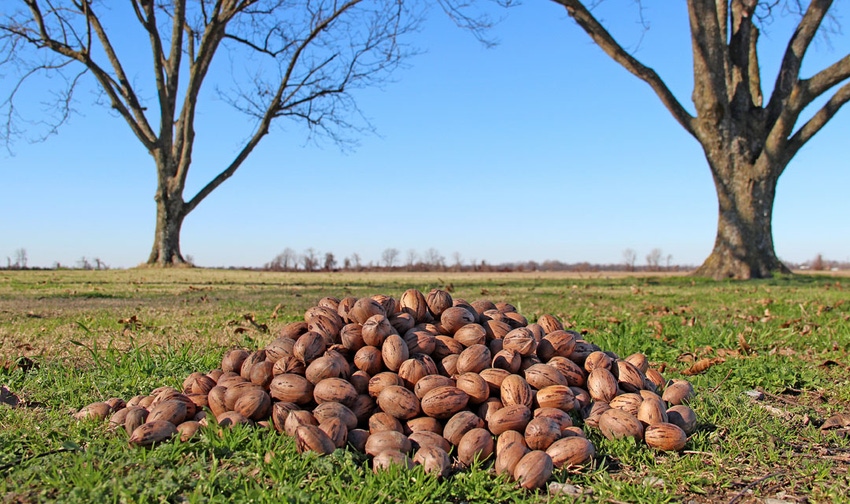
With the holidays closing in and pecan harvest well underway in most pecan producing states, USDA and the Agricultural Marketing Resource Center (AgMRC) are predicting a good year for the U.S. pecan industry. Export demand remains high while domestic consumption shows signs of growth as more consumers turn to the nut as a high value health food.
U.S. commercial pecan production was reported in 14 states last year, and overall the United States produces more than 80 percent of the world’s pecans. Of that, three-fourths of U.S. pecans were produced in the states of Georgia (102 million pounds), New Mexico (61 million pounds) and Texas (32 million pounds). The total U.S. pecan crop was valued at about $550 million, down considerably from 2010 because of extreme drought conditions. In 2010, U.S. pecan production was 293.7 million pounds and was valued at $674.8 million.
(For more, see: California pecan industry the 'comeback kid')
In addition to commercial crop pecans, according to the 2008 Organic Production Survey (NASS 2010), the United States had 46 farms certified for organic pecan production. Those farms raised 1.3 million pounds of pecans and 45 farms reported sales totaling $2.3 million.
In spite of continuing drought conditions across much of the nation, agricultural forecasters predict the pecan industry will recover some from last year. Production is expected to rise and prices are expected to remain strong, fueled in part by a continuing high demand for pecans in China. U.S. fresh/dried pecan 2010-11 exports were valued at $300.5 million for a total of 157.1 million pounds sold. This represents substantial increases over 2006-07 exports levels, which were 70.1 million pounds valued at $172.8 million.
China represents the fastest-growing export market, with 2010 U.S. pecan export volumes exceeding 3,008 metric tons.
The marketing season for U.S.-grown pecans begin in October and harvesting is complete by the end of March. Of tree nut consumption in the United States, pecans rank third behind almonds and English walnuts. Interestingly, pecan per capita consumption has held nearly constant over the past several decades, ranging from 0.38 pounds in 1968 to 0.45 pounds consumed per person in 2009.
Pecans as a health food
But thanks in part to a USDA funded grant program, researchers are developing marketing strategies that will capitalize on pecans’ growing popularity as a health and nutrition food product.
(For more, see: New pecan variety available to US producers)
Recently, USDA awarded a $2.4 million grant to market the benefits of pecans. The researchers are working with colleagues at the University of Georgia and Texas A&M. Their focus is helping pecan growers stay competitive by capitalizing on the crop's nutritional benefits.
Cooperative Extension specialist Richard Heerema says New Mexico State University became interested in participating in the grant because researchers have seen a major shift in the way consumers and nutritionists have come to look at pecans. Meanwhile, researchers at Texas A&M have been busy breeding new varieties of pecans.
Pawnee is a new, extremely early-ripening variety developed by TAMU breeders and recommended especially for the Texas Panhandle. It is a medium-size pecan with good kernel quality. Researchers say additional years of evaluation are needed before recommending it for all of Texas, but so far the variety appears to have a natural resistance to aphids, a leading pecan pest.
Concerning nutritional value, one ounce of pecans (about 19 pieces) has 195 calories, 3 grams of fiber and both heart-healthy mono and polyunsaturated fats. Pecans also contain such minerals as zinc, magnesium, copper, iron and selenium. A 2011 study published in the Journal of Nutrition reported vitamin E and other compounds found in pecans may help prevent heart disease.
About the Author(s)
You May Also Like






